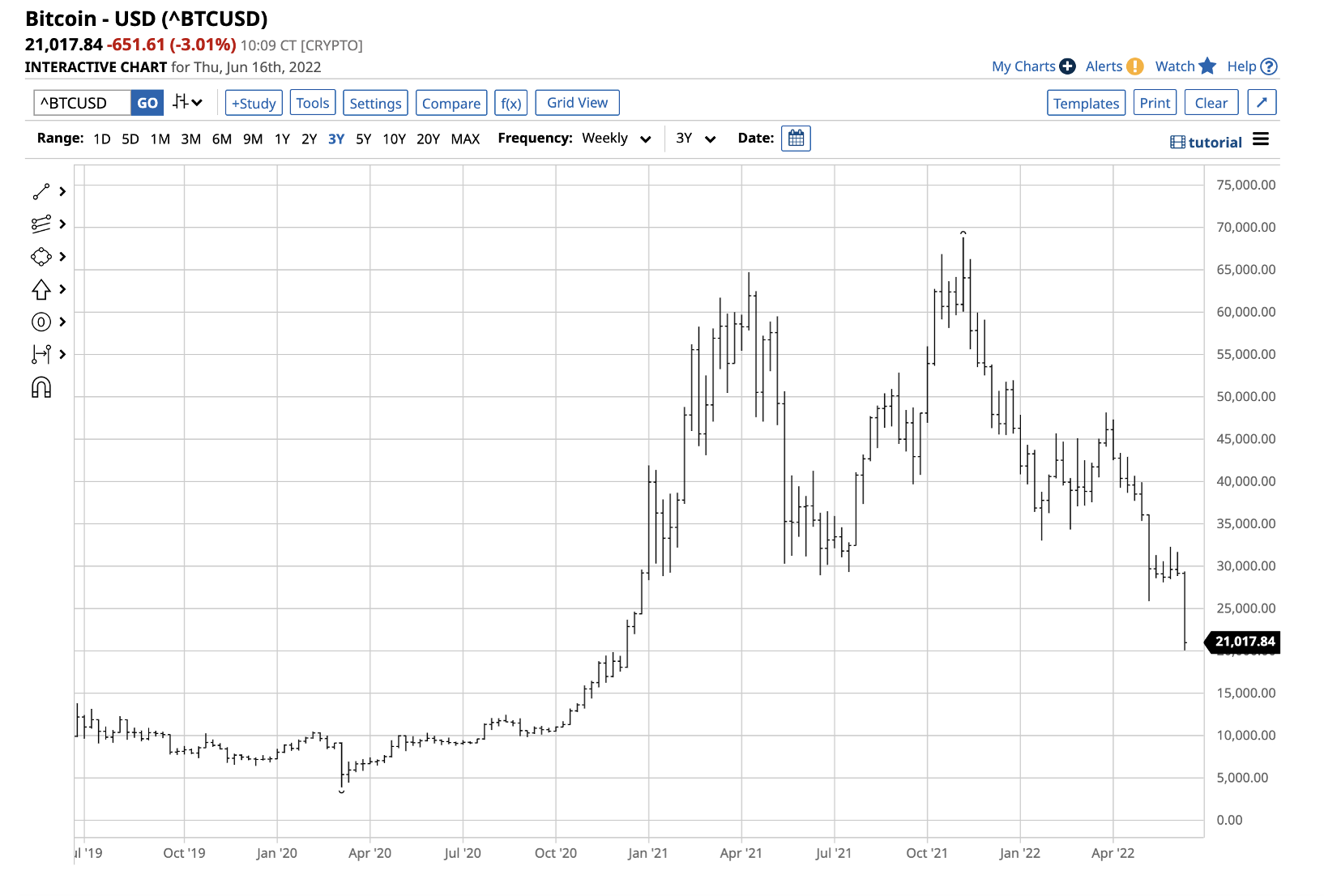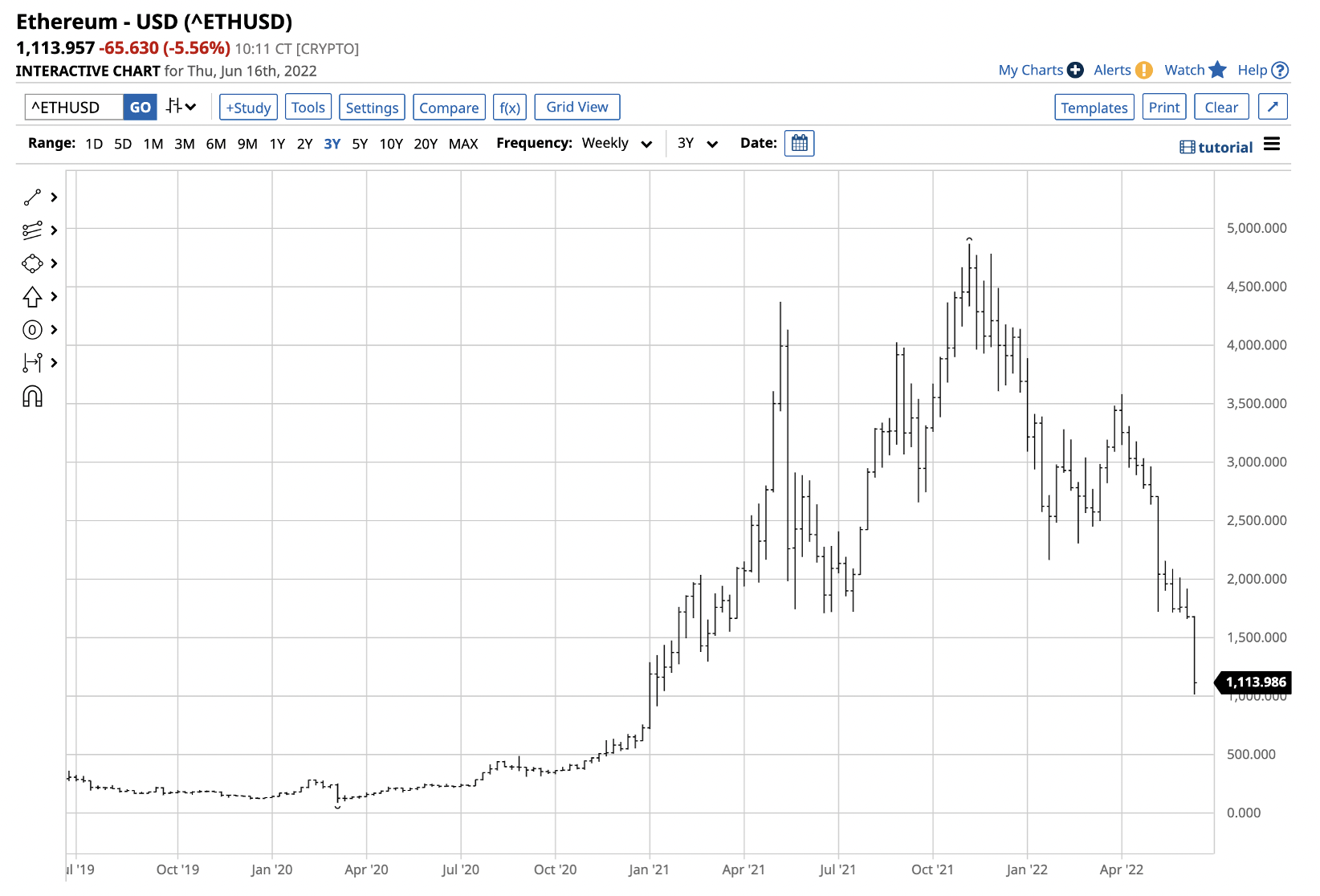This article was written exclusively for Investing.com
- Cryptos continue to trend lower
- Sweeping regulation has bipartisan support
- Growing crypto lobby
- Addressable market is expanding
- Expect pushback for one significant reason
The motivation for regulating cryptocurrencies seemed to have declined with their prices since the November 2021 record highs which brought their collective market cap to more than $3 trillion. The asset class's market cap has since declined, reaching the $1.2 trillion level on Friday, but, after Bitcoin briefly tumbled below $18,000 over the weekend before recovering to the $20K level at the time of publication, that market valuation has gotten even smaller.
The lower valuation reduces the systemic risks for the US and global financial system, but, the current slump could be the perfect time to establish the rules and regulations to foster growth and ensure future market operations. And that coincides with an SEC Commissioner recently saying the regulatory body needed to address the burgeoning asset class to encourage innovation and protect consumers and market participants.
This month, the U.S. Senate, a body that typically moves at a snail’s pace, unveiled a wide-ranging legislative proposal for cryptos and other digital assets.
Cryptos Continue To Trend Lower
Rising interest rates have weighed on stocks and bonds, and cryptocurrencies were not immune from the selling in markets across all asset classes. Over the weekend, Bitcoin and Ethereum fell to new recent lows, extending the bearish trend that began in November 2021.

Source: Barchart
The chart shows the decline below $20,120, a level not seen since December 2020.

Source: Barchart
Ethereum dropped below $1,015 per token on June 15, the lowest price since January 2021. The trends remain bearish, with consolidation at decreasing levels giving way to lower lows.
Sweeping Regulation Has Bipartisan Support
Senators Kirsten Gillibrand, a Democrat from New York, and Cynthia Lummis, a Republican from Wyoming, joined forces to propose the most wide-ranging legislative proposal to regulate cryptocurrencies and other digital assets.
The bill they call the “Responsible Financial Innovation Act," outlines legal definitions of digital assets and virtual currencies, would require the U.S. Internal Revenue Service to adopt guidance on merchant acceptance of digital assets and charitable contributions, and would distinguish between digital assets that are commodities and those that are securities, which has been a grey area for the asset class.
The proposed legislation follows on the heels of U.S. President Joe Biden’s March executive order urging the Federal Reserve to explore if the central bank would create a digital U.S. currency. The order also directed federal agencies, including the Treasury Department, to study the impact of cryptocurrency on financial stability and national security.
Treasury Secretary Janet Yellen said:
“We have a strong interest in ensuring that innovation does not lead to a fragmentation in international payment architectures.”
The Treasury Secretary has warned that government regulation needs to police the proliferation of cryptocurrency and deal with fraudulent or illicit transactions.
Growing Crypto Lobby
While cryptocurrency values are declining and the Senate will consider Senators Gillibrand and Lummis’s proposal, crypto lobbying in Washington has become a booming business. The number of cryptocurrency lobbyists hit 320 in 2021, up from 115 in 2019.
Spending on crypto-focused representation increased from $2.2 million to $9 million over the period, with the bulk of funds coming from Coinbase (NASDAQ:COIN), Ripple and the Blockchain associations. Crypto lobbyists include a handful of former high-profile government officials from each party advocating for the asset class as Washington begins to establish the asset class’s regulatory framework.
Addressable Market Expanding
The addressable market for cryptocurrencies has grown as the asset class has taken giant steps forward, with mainstream investors looking to add cryptos to portfolios. In May 2022, JP Morgan Chase replaced real estate with cryptocurrencies as a “preferred alternative asset,” saying they were undervalued.
The most recent declines made Bitcoin, Ethereum, and many of the nearly 20,000 cryptocurrencies even more undervalued, according to the JP Morgan analysts.
More money managers are including crypto exposure in portfolios, and hedge funds have been active in the market. Even though crypto prices have fallen, the overall market has increased as it moves towards more mainstream acceptance.
Expect Pushback For One Significant Reason
While custody, security, and regulation remain significant risk factors for the cryptocurrency asset class, the most significant roadblock could be the government’s control of the money supply.
Expanding and contracting the supply of currency to impact economic trends and support policy agendas is a powerful tool. A growing cryptocurrency market would siphon off the government’s ability to manipulate the money supply as it dilutes the position of the U.S. dollar and other world fiat currencies.
While Washington legislators, regulators, and the administration have not expressly attacked cryptos as a challenger to their fiat currency powers, the fact is that the rise of cryptos will be the fall of the fiats. While governments could intervene and manipulate cryptos, they could be harder to control than fiat currency markets. Moreover, the ideological philosophy underpinning cryptos is libertarian, returning the power of the money supply to individuals. Therefore, the philosophy alone is why government pushback is not only likely but a certainty.
The latest Senate initiative to address, define and validate cryptocurrencies could be lip service that runs into a brick wall of opposition over the coming weeks and months.
